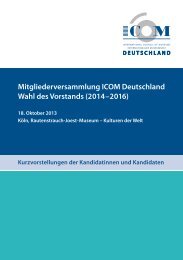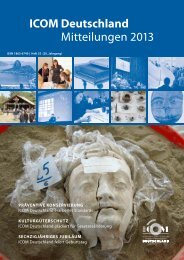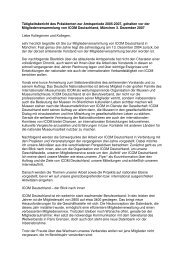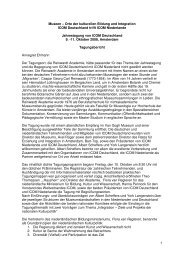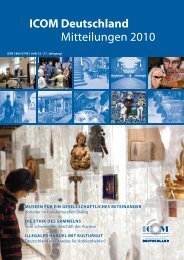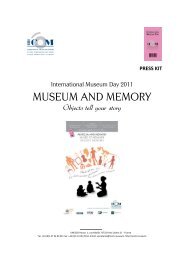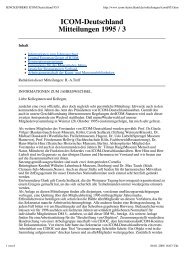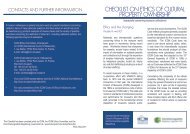ICOM Code of Ethics for Museums - The International Council of ...
ICOM Code of Ethics for Museums - The International Council of ...
ICOM Code of Ethics for Museums - The International Council of ...
Create successful ePaper yourself
Turn your PDF publications into a flip-book with our unique Google optimized e-Paper software.
procedures should be documented and as<br />
reversible as possible, and all alterations<br />
should be clearly distinguishable from the<br />
original object or specimen.<br />
2. 25 Welfare <strong>of</strong> live Animals<br />
A museum that maintains living animals<br />
should assume full responsibility <strong>for</strong> their<br />
health and well-being. It should prepare<br />
and implement a safety code <strong>for</strong> the protection<br />
<strong>of</strong> its personnel and visitors, as well<br />
as <strong>of</strong> the animals, that has been approved<br />
by an expert in the veterinary field.<br />
Genetic modification should be clearly<br />
identifiable.<br />
2.26 personal Use <strong>of</strong> Museum<br />
Collections<br />
Museum personnel, the governing body,<br />
their families, close associates, or others<br />
should not be permitted to expropriate<br />
items from the museum collections, even<br />
temporarily, <strong>for</strong> any personal use.<br />
3. MUSEUMS HOlD pRIMARy EVIDENCE FOR ESTABlISHING<br />
AND FURTHERING KNOWlEDGE.<br />
principle<br />
<strong>Museums</strong> have particular responsibilities to all <strong>for</strong> the care, accessibility and<br />
interpretation <strong>of</strong> primary evidence collected and held in their collections.<br />
pRIMARy EVIDENCE<br />
3.1 Collections as primary<br />
Evidence<br />
<strong>The</strong> museum collections policy should indicate<br />
clearly the significance <strong>of</strong> collections<br />
as primary evidence. <strong>The</strong> policy should not<br />
be governed only by current intellectual<br />
trends or present museum usage.<br />
3.2 Availability <strong>of</strong> Collections<br />
<strong>Museums</strong> have a particular responsibility<br />
<strong>for</strong> making collections and all relevant in<strong>for</strong>mation<br />
available as freely as possible,<br />
having regard to restraints arising <strong>for</strong> reasons<br />
<strong>of</strong> confidentiality and security.<br />
MUSEUM COllECTING & RESEARCH<br />
3.3 Field Collecting<br />
<strong>Museums</strong> undertaking field collecting<br />
should develop policies consistent with<br />
academic standards and applicable national<br />
and international laws and treaty<br />
obligations. Fieldwork should only be<br />
undertaken with respect and consideration<br />
<strong>for</strong> the views <strong>of</strong> local communities,<br />
their environmental resources and cultural<br />
practices as well as ef<strong>for</strong>ts to enhance the<br />
cultural and natural heritage.<br />
3.4 Exceptional Collecting <strong>of</strong><br />
primary Evidence<br />
In exceptional cases an item without provenance<br />
may have such an inherently<br />
outstanding contribution to knowledge<br />
that it would be in the public interest to<br />
preserve it. <strong>The</strong> acceptance <strong>of</strong> such an<br />
item into a museum collection should be<br />
the subject <strong>of</strong> a decision by specialists in<br />
the discipline concerned and without national<br />
or international prejudice. (See also 2.11).<br />
6




